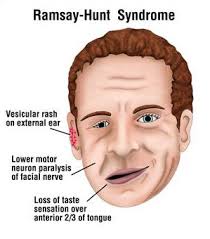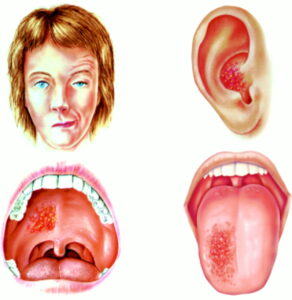- Ramsay Hunt syndrome (RHS) is a rare neurological disorder characterized by paralysis of the facial nerve (facial palsy) and a rash affecting the ear or mouth.
- Ear abnormalities such as ringing in the ears (tinnitus) and hearing loss may also be present.
- Ramsay Hunt syndrome is caused by the varicella zoster virus (VZV), the same virus that causes chickenpox in children and shingles (herpes zoster) in adults.
- In cases of Ramsay Hunt syndrome, previously inactive (dormant) varicella-zoster virus is reactivated and spreads to affect the facial nerve.
What is Ramsay Hunt syndrome?
Ramsay Hunt syndrome is a neurological condition caused by varicella zoster virus, the same virus that causes chickenpox in children and shingles in adults. The virus can linger in your body for your entire life, even long after you have recovered from chickenpox, and reawaken to irritate and inflame the nerves in your face.

The illness affects men and women equally and can result in paralysis on one side of the face and painful, blistering rashes. It is more common in older people, and some patients experience changes in their hearing, perhaps perceiving sounds louder in one ear than another or developing tinnitus (a chronic ringing in the ears) or even deafness in one ear. Ear and facial pain is commonly a part of the syndrome, and some patients may suffer from vertigo. The syndrome is officially known as herpes zoster oticus; its more common name comes from the neurologist James Ramsay Hunt, who first described the illness.
It can take a long time for people with the syndrome to receive an accurate diagnosis, according to researchers. The term Ramsay Hunt is notoriously vague and the illness can have symptoms similar to Bell’s palsy, which can also induce facial paralysis. Doctors usually diagnose Ramsay Hunt syndrome by identifying small blisters that have appeared in a patient’s ear.
Signs, Symptoms & Causes
The symptoms of Ramsay Hunt syndrome vary from case to case. Affected individuals usually experience paralysis (palsy) of the facial nerve and a rash affecting the ear. These two symptoms do not always occur simultaneously. In most cases, only one side of the face is affected (unilateral).
Facial muscles affected by nerve palsy may be weak or feel stiff and may result in the inability of affected individuals to smile, wrinkle the forehead or close their eye on the affected side. In some cases, speech may become slurred.
Most cases of Ramsay Hunt syndrome have a reddish (erythematous), painful, blistering (vesicular) rash that affects the outer portion of the ear (pinna) and often the external ear canal. In some cases, the rash, including painful blisters, may also affect the mouth, soft palate, and top portion of the throat. Some individuals with Ramsay Hunt syndrome may have facial palsy with evidence of varicella-zoster virus through testing (e.g., blood tests), but without the associated skin abnormalities. These cases may be referred to as zoster sine herpete.
Additional symptoms affecting the ear include ringing in the ear (tinnitus) and ear pain (otalgia). In some cases, ear pain may be intense. Pain may spread to affect the neck. Some affected individuals develop sensorineural hearing loss, a condition in which sound vibrations are not properly transmitted to the brain due to a defect of the inner ear or the auditory nerve, resulting in hearing loss. Hearing loss is usually temporary (transient), however, in rare cases it may become permanent.
In some cases, affected individuals may experience hyperacusis, a condition in which sounds appear louder (often dramatically) than normal. This can cause tremendous discomfort for affected individuals.
Additional symptoms that may be present include nausea, vomiting, and a sensation that one’s surroundings are spinning (vertigo). In rare cases, loss of taste, dry mouth, and dry eyes may also occur.
Ramsay Hunt syndrome is caused by the varicella-zoster virus, which is the same virus that causes chickenpox and shingles. The virus can remain dormant for decades in a person who has had chickenpox as a child. Reactivation of the varicella-zoster virus results in shingles and, in some cases, develops into Ramsay Hunt syndrome. The reason why the virus reactivates and affects the facial nerve in Ramsay Hunt syndrome is unknown.
Diagnosis & Treatment
A diagnosis of Ramsay Hunt syndrome is based on thorough clinical evaluation, a detailed patient history and identification of characteristic symptoms (i.e. facial palsy and rash). Viral studies can detect varicella-zoster virus in saliva, tears, and blood but are not necessary to establish a diagnosis of Ramsay Hunt syndrome.

The diagnosis of Ramsay Hunt syndrome can be difficult because the specific symptoms of the disorder (otalgia, facial paralysis and the distinctive rash) do not always develop at the same time.
The treatment of Ramsay Hunt syndrome commonly involves antiviral medications, like acyclovir or famciclovir, in conjunction with corticosteroids, like prednisone. Most authorities agree that beginning antiviral treatment within three days of onset appears to have the greatest benefit as prompt diagnosis and management seems to improve outcomes. Despite therapy, some degree of facial paralysis and hearing loss may become permanent in some cases.
Further treatment is directed towards specific symptoms that are apparent in each individual. This includes pain medication, carbamazepine, an anti-seizure medicine which may help reduce neuralgic pain, and vertigo suppressants like antihistamines and anticholinergics.
Individuals with Ramsay Hunt syndrome need to take special care to prevent corneal injury because the inability to properly close the eye can expose the cornea to abnormal drying and foreign body irritation. Artificial tears and lubricating ointments may be prescribed to protect the cornea.
Affected Populations
Ramsay Hunt syndrome affects males and females in equal numbers. According to one estimate, 5 out of every 100,000 people develop Ramsay Hunt syndrome each year in the United States. The disorder is the second most common cause of atraumatic peripheral facial paralysis. Some researchers believe cases of Ramsay Hunt syndrome go undiagnosed or misdiagnosed making it difficult to determine the disorder’s true frequency in the general population.
Anyone who has had chickenpox can potentially develop Ramsay Hunt syndrome. However, most cases affect older adults, especially those over 60. Ramsay Hunt syndrome affecting children is extremely rare.
References
JOURNAL ARTICLE
Sweeney CJ, Gilden DH. Ramsay Hunt syndrome. J Neurol Neurosurg Psychiatry. 2001;71:149-54.
de Mondonca Vaz R, Linthicum Jr FH. Ramsay Hunt syndrome: a histopathology observation of a facial sequelae. Otol Neurol. 2009;30:428-429.
Kim D, Bhimani M. Ramsay Hunt syndrome presenting as simple otitis externa. CJEM. 2008;10:247-250.
Fota-Markowska HZ, Rolla-Szczepanska R, Modrzewska, Kiciak SG. Ramsay Hunt syndrome? a case study. Wiad Lek. 2003;56:375-7.
Uri N, Greenberg E, Kitzes-Cohen R, Doweck I. Acyclovir in the treatment of Ramsay Hunt syndrome. Otolaryngeal Head Neck Surg. 2003;129:379-81.
Kuhweide R, Van de Steene V, Vlaminck S, Casselman JW. Ramsay Hunt syndrome: pathophysiology of cochleovestibular symptoms. J Laryngol Otol. 2002;116:844-8.
Grose C, Bonthius D, Afifi AK. Chickenpox in the geniculate ganglion: facial nerve palsy, Ramsay Hunt syndrome and acyclovir treatment. Pediatr Infect Dis J. 2002;21:615-7.
Kaberos A, Balatsouras DG, Korres SG, Kandiloros D, Economou C. Audiological assessment in Ramsay Hunt syndrome. Ann Otol Rhinol Laryngol. 2002;111:68-76.
Kinishi M, Amatsu M, Mohri M, et al., Acyclovir improves recovery rate of facial nerve palsy in patients with Ramsay Hunt syndrome. Auris Nasus Larynx. 2001;28:223-6.
Morrow MJ. Bell’s palsy and herpes zoster oticus. Curr Treat Options Neurol. 2000;2:407-16.
Adour KK. Otological complications of herpes zoster. Ann Neurol. 1994;35:S62-4.
TEXTBOOKS
Rowland LP, ed. Merritt’s Neurology. 10th ed. Lippincott Williams & Wilkins. Philadelphia, PA. 2000:441.
Adams, RD, et al., eds. Principles of Neurology. 6th ed. New York, NY: McGraw-Hill, Companies; 1997:188-9.
WEBPAGES
National Institute of Neurological Disorders and Stoke. Herpes Zoster Oticus Information Page. February 14, 2007. Available at: http://www.ninds.nih.gov/disorders/ramsay2/ramsay2.htm Accessed: November 10, 2010.
Miravalle AA. Ramsay Hunt Syndrome. eMedicine Journal. August 20, 2009. Available at: http://emedicine.medscape.com/article/1166804-overview Accessed: November 10, 2010.
Mayo Clinic for Medical Education and Research. Ramsay Hunt Syndrome. January 9, 2009. Available at: http://www.mayoclinic.com/health/ramsay-hunt-syndrome/DS00878 Accessed: November 10, 2010.